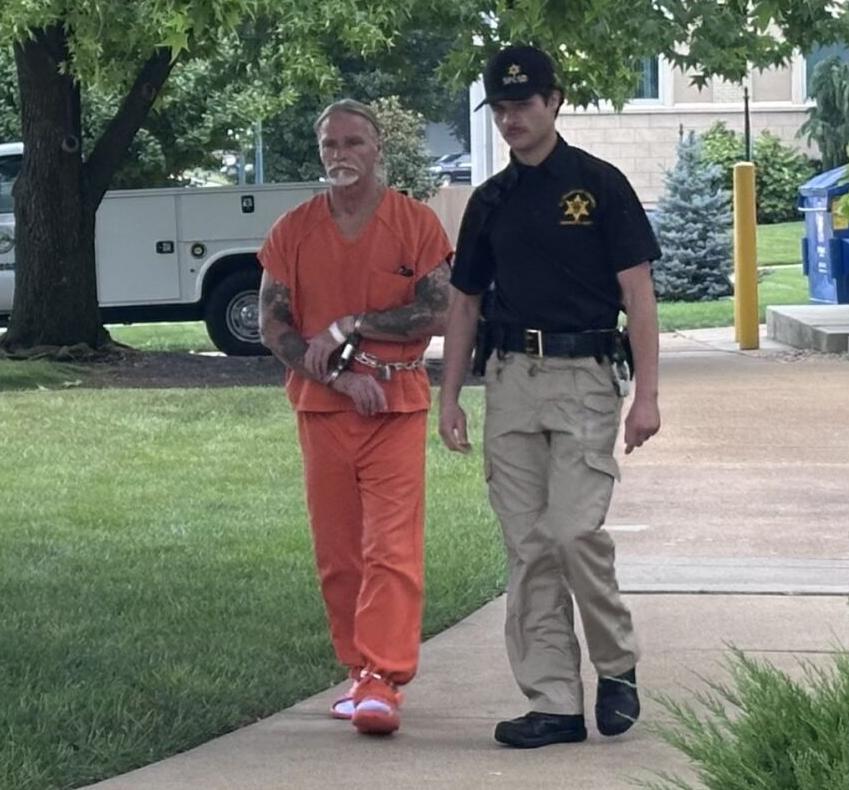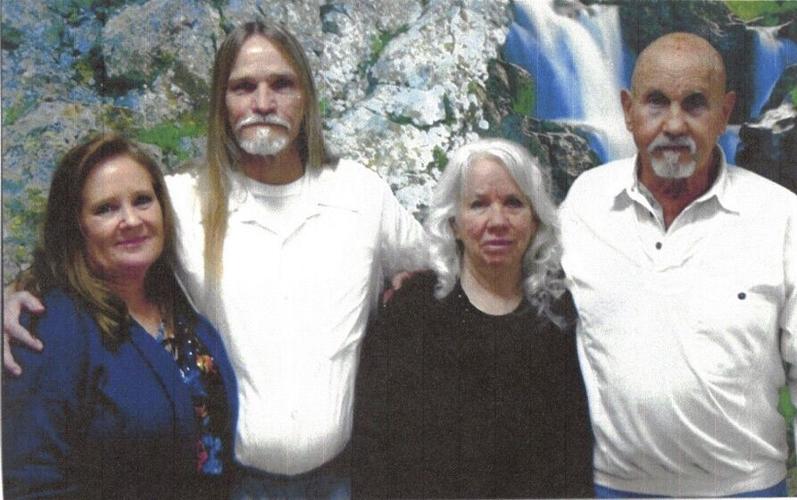FARMINGTON, Mo. — Rodney Carr is walking in Larry Callanan’s footsteps.
More than 20 years ago, Callanan was in the Potosi Correctional Center, serving a life sentence for a 1996 murder conviction. The union pipefitter from ӣ����Ƶ County was fighting to overturn his wrongful conviction, and he accomplished that goal in 2020. While he was in prison, Callanan volunteered to help with ill patients, guiding them around in wheelchairs and helping with daily tasks.
That’s how he met Robert Driscoll, who had been convicted in the stabbing death of corrections officer Tom Jackson during a riot in the Moberly prison on July 3, 1983.
It was perhaps the most infamous day in Missouri prison history. Dozens of prisoners, most of them drunk on homemade hooch, attacked Jackson and other guards with knives and other weapons they had made and hidden in their cells. The riot started when Driscoll’s cell mate, drunk out of his mind, got mouthy with corrections officers. They removed him from the cell. One of the officers allegedly threatened to beat the man to teach him a lesson. One thing led to another. One inmate yelled, “Rush him,” and prisoners in the overcrowded facility attacked. Jackson died. Several other officers were stabbed.
People are also reading…
Carr, who grew up in north ӣ����Ƶ, was an inmate at the prison at the time. He was one of three men charged and convicted in Jackson’s death.
Years later, in a different prison, Callanan would push Driscoll around in a wheelchair. And Driscoll would talk about the riot.

Rodney Carr, second from left, poses in prison for a picture with his wife, Peggy, and his parents, John and Ann.
“Driscoll said he stabbed Jackson,” Callanan testified in St. Francois County Circuit Court on Tuesday afternoon, where Carr was seeking his freedom in a week-long hearing. “Driscoll said Carr had absolutely nothing to do with it. He never relented. It wasn’t a mystery in there that Rodney was innocent.”
Callanan, who knows as well as anybody how hard it is to prove one’s innocence after a bad conviction, was sitting a few feet from Carr when he spoke from the witness stand.
Carr, 63, sat mostly stoically during the hearing, his hands freed from shackles so he could take notes and use his reading glasses.
His long gray hair is pulled back into a ponytail. His white goatee matches the one of his father, John, who has been sitting in the courtroom with his wife, Ann; family members and friends; and Carr’s wife and high school sweetheart, Peggy. They got married in 2019.
In the 1980s, Carr was in Moberly on a stealing conviction and was due to be released about a month after the riot. Instead, he’s spent nearly his entire adult life behind bars.
In addition to Carr, Driscoll and Roy Roberts were also convicted of murder after the riot. Roberts was put to death in 1999. Driscoll’s case was later reduced by a jury to voluntary manslaughter. He was released from prison and died a few years later. Carr has consistently maintained his innocence.
“Here, a manifest injustice has occurred,” attorney Elizabeth Ramsey argued in court this week.
Ramsey, of ӣ����Ƶ, is representing Carr along with her husband, Ben McIntosh, and her father, Robert Ramsey.
“There is no physical evidence that connects Mr. Carr to this crime,” she said.
Testimony in Carr’s case ended Thursday. The ruling of Circuit Judge Patrick King likely won’t come for a couple of months.
Carr, like Callanan did, spends time taking care of inmates who are ill. He also hopes to have a similar result in court as Callanan, after a chance to present his innocence to a judge after several failed tries.
In the past few years, several pieces of evidence have emerged pointing to Carr’s innocence, including a letter the former prosecutor in his case — Tim Finnical — wrote in 2019.
“Mr. Carr was not the person who actually stabbed the victim,” Finnical wrote in a letter to the governor’s office seeking a pardon for Carr. During Carr’s criminal case, Finnical had argued the opposite.
The letter was introduced as evidence in the hearing this week, but how much weight King gives it is an open question. The same year Finnical wrote the letter, he was diagnosed with a brain tumor that prevents him from testifying. The Missouri Attorney General’s office pointed to Finnical’s condition to try to block the letter from being introduced in the case.
That theme — the age or mental condition of various witnesses, and the fact that many of them have died in the 42 years since the riot — makes it impossible to overturn Carr’s conviction, Assistant Attorney General Michael Spillane argued in court.
But two inmates who took part in the riot — Rick Beatty and Edward Ruegg — testified that Carr had nothing to do with Jackson’s death.

Rodney Carr walks with a St. Francis County Sheriff’s deputy to the county jail on Thursday, July 17, 2025. Carr attended a court hearing this week in which he is seeking to overturn his murder conviction from a 1983 prison riot.
“Rodney got hit in the head with a ball bat,” said Beatty, who is still in prison. “He was down and he was knocked out. Rodney Carr did not stab any officers.”
Beatty admitted that he didn’t initially offer investigators that story. He and Ruegge both said corrections officers beat inmates in the hours and days after the riot, particularly on a slow bus ride to the Jefferson City prison the day after the event. Beatty said he didn’t want to testify back then.
“Nobody wants to be that guy,” ratting on a fellow inmate, Beatty said, “because you might be the next guy” to get stabbed.
Ruegg, who now lives in Hermann, couldn’t hold back tears as he recounted Jackson’s death. Ruegg, who was never charged in the case, said he punched the officer as Driscoll stabbed him. Carr was nowhere near the melee, Ruegg testified.
When the beating and stabbing were over, Ruegg said, he “scraped Officer Jackson off the ground and carried him to the infirmary. … I’ve been reliving it for 42 (expletive) years.”
So, too, has Carr, whose fate is now in King’s hands as the judge decides what to believe: the confessions of aging men seeking to clear a conscience, or the lies those men told when they were young and under threat by officers who had lost a colleague.
“They were mad. That place was chaos,” Beatty testified.
He says officers used beatings to try to coerce testimony against Jackson’s alleged killers. Beatty’s testimony is backed by evidence in another case.
Several inmates won a civil rights lawsuit against the state a couple of years after the riot, where evidence of the beatings was outlined in detail.
“They were just trying to get a case,” Beatty said, “and they didn’t care how they did it.”
ӣ����Ƶ metro columnist Tony Messenger thanks his readers and explains how to get in contact with him.










